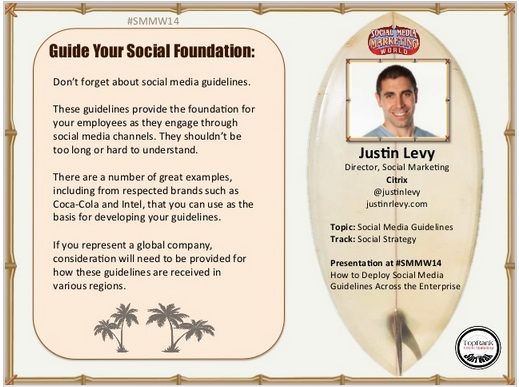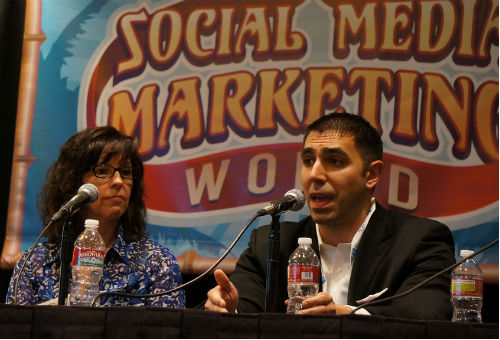
When I first met Justin Levy a number of years ago, he gave me a business card for a Brazilian steakhouse and I didn’t quite make the connection with the social media conference we were at. Following him online and running into each other at numerous conferences since, I’ve learned three things about Justin: 1. He’s incredibly fit. 2. He’s an amazing cook. 3. He’s equally intelligent and passionate when it comes to social media.
In this Social Media Smarts interview, Justin covers everything from how he came in to the social media world to how marketing and PR work together with social media programs to what he really thinks of Facebook. He also offers practical tips, insights, tools and resources that he uses to stay social media fit in his role in charge of Global Social Media at Citrix.
Whether your a corporate marketer, agency or consultant, I would recommend taking his advice.
You have an interesting background and journey into the corporate social media world from Caminito Argentinean Steakhouse to New Marketing Labs. Please share about your journey to Director, Social Marketing at Citrix.
I always had an interest in how technology allowed us to connect, whether it be forums, instant messaging or social networks. In the early days of platforms such as Twitter, Facebook and YouTube, I was convinced that these tools could be leveraged to build community, impact organic search and, ultimately, lead to increased revenue.
Around this time my best friend had risen through the cooking ranks and had become the Executive Chef and owner of Caminito Argentinean Steakhouse. The steakhouse was losing revenue at 30-35% per month even though the product, wood-fire grilled steaks, were among the best I had ever tried. The steakhouse simply wasn’t receiving the amount of foot traffic it needed. Though I already had a full-time job, I would occasionally travel the 50 miles to the restaurant to help serve tables or discuss strategy. After a while I took a minority role in the steakhouse, focused on marketing efforts.
We revamped the website with a focus on organic search and visuals, started building an email list, launched a food blog and an educational food video show. Within the first 30 days or so post-launch of these efforts, sales grew upwards of 50%, bringing the steakhouse 20% into the black. For the next 30 months straight we successfully grew a minimum of 20% per month as compared to the same month the previous year. This strategy brought more customers into the steakhouse to taste the incredible food that my best friend was cooking. This increase in customer growth brought several awards and case studies written about our successes.
Chris Brogan and I became friends over the course of a few conferences and we had a chance to drive together to an event being hosted by Jeff Pulver in New York. Over the few hours drive each way we began talking about where we thought social media was headed and that there was a big opportunity to help large companies. Chris was being approached by large companies such as Citrix and was working on launching New Marketing Labs. Citrix became the first client and I became the first employee of New Marketing Labs.
We worked hard to be helpful and provide value to the amazing clients that we were able to work with, including Citrix. Working closely with the Citrix team, I began to see why the company is regularly rated one of the best places to work. The culture and innovation was unlike anything I had seen elsewhere.
I left New Marketing Labs to take on a role at Citrix leading divisional social communications. That role expanded over the past few years to the point where I’m at now, leading social media globally for the company.

In your tip for the SMMW14 Social Media Marketing eBook, you mentioned the importance of social media guidelines. How practical is it to enforce guidelines? Recently, a very high profile employee at a major B2B brand was released due to violating social media guidelines. How often should companies revisit and revise?
Companies need to consistently evaluate and update, when necessary, their social media guidelines. Because there is little precedent in social media, federal organizations are constantly reviewing cases and providing guidance to companies.
For example, in 2011 and 2012 the National Labor Relations Board issued three separate memos reviewing approximately 27 cases where there had been complaints where employees had been dismissed for violating social media guidelines. The Federal Trade Commission has also recently investigated a well-known brand for a Pinterest campaign they executed.
Reviews like this will continue and it is important for social media managers to stay aligned with their Legal and HR teams to ensure that they’re protecting the company.
What are some great examples of companies or organizations’ social media policies?
There are several companies that have excellent social media guidelines. One of the companies that I often reference is Coca-Cola.
Coca-Cola is a global company operating in 200+ countries with 150,000+ associates and over 500 sparkling and still brands. They have boiled their guidelines down into 15 main points – 5 company commitments, 5 personal use exceptions and 5 spokespeople expectations.
I would be remiss if I didn’t mention our Citrix social media guidelines which we have successfully scaled to all 10,000 employees in 6 languages (English, Spanish, German, French, Mandarin and Japanese) as mandatory compliance training.
As the Director of Social Media, how does the intersection between PR and marketing social media work? How is it structured? Any tips? for other companies deciding “Who owns social media?”
We work in tight coordination with a number of teams including PR, internal communications, product marketing, demand marketing, legal, HR, IT and many others. To be effective, social media has to be integrated throughout the fabric of the company, not just within a single function. That means that social media team members will be involved in key projects, announcements and other planning cycles.
At Citrix social media reports into Corporate Marketing but works across the entire company. We recently launched a company-wide Social Media Center of Excellence to help as a centralized hub providing strategy, resources, training and enablement in order to provide company-wide standardization, increased efficiency, effectiveness and reduced costs.
Regardless of who “owns” social media, it is imperative that the social media team puts a priority on building relationships and understanding how social media can be helpful to overall business objectives. Focusing on these partnerships help drive more business impact rather than focusing on where social media is situated within a company.

Waynette Tubbs of SAS & Justin Levy of Citrix discuss big brand blogging.
Do you consider blogging to be social media? Why or why not?
Yes, I do consider blogging to be a form of social media and is one of the only platforms that a company or individual can own. A blog should be a main driver of inbound traffic to a company’s website, while social media channels serve as outposts.
What do you think about the emerging trend of removing comments from blogs?
The decision whether or not to remove comments from a blog is a business decision that each business has to consider for themselves. The Copyblogger team made a decision that was right for their business at this time. That might change or evolve over time if they think it is right for their business. Companies considering removing comments also have to realize that their blog is likely not to the size of Copyblogger. Not every blog, just like not every business strategy, is created equal.
For many companies, encouraging employees to blog is a LOT easier said than done. At least in a way that fosters self expression, serves customers and brand goals – all at the same time. What’s your take? Any words of advice?
Absolutely agree! Maintaining a multi-author blog is a LOT harder than it might seem especially for companies where employees may not have experience writing. It has been my experience that many are intimidated by writing on behalf of the company. It is uncomfortable for them. It takes longer to work with these employees on drafting a blog post and educating them. However, though it is hard, it benefits not only the company but also the employees who take part.
For those just getting started, I’d recommend developing a blog guidelines document. Provide a framework for employees to work within. Include tips and resource links that they can reference throughout the process.
Another effective method is to encourage employees to record their thoughts. No or minimal prep. Hit record and share thoughts on a topic that they’re passionate about or have specific expertise. They can then work through transcribing those recordings and then editing that down from there into a blog post (or even several!).
Does SEO play any kind of role with your social media and social content efforts? How?
I am a strong believer in the impact of SEO. We have continually worked to partner closely with our Search team. We are constantly interfacing with them on projects ranging from our video strategy to evaluating updates to social media platforms and their potential impact on search rank. We regularly monitor social referrer traffic to our key domains or key sections and work on projects to improve the joint impact of search and social.
What are some of the social media tools that you rely on for social media monitoring, analytics, or reporting?
Three tools that we regularly rely on for social media monitoring, analytics and reporting are:
- Radian6
- Simply Measured
- Google Analytics
Each of these tools provide a different layer or level of metrics to help us with listening and determining the effectiveness of our social media efforts.
Let’s play elevator tips: You’ve just met a small business owner on the 1st of 36 floors and they ask you for that one thing to help make the most out of their social media marketing. Go!
I would ask them what their business goals and desired outcomes are of using social media. Social media efforts must be tied to business objectives. If the business owner wasn’t able to answer that on the spot, I’d recommend that they work on that.
While they were working through that, I’d also recommend, as a basic step, they secure their brand name across the most important social media channels. Hopefully a consistent name is available across all platforms so as to not confuse prospects, customers and fans!
What are some of the information resources, events and networks that you draw from to stay current with industry news and best practices?
This blog is one of them! (Thanks!) I rely on the smarts of folks like Jay Baer, Tom Webster, Christopher Penn, Scott Monty, C.C. Chapman, Ann Handley, Mark Schaefer, Jason Falls, some guy named Lee Odden and many, many more. Through these friendships, writings, podcasts, speeches, books and multitude of other content they create, I am constantly learning and evolving.
The best social media conferences to attend are Social Fresh, Social Media Marketing World and Dreamforce. Jason Keath, Mike Stelzner and the Salesforce team put on different style conferences that are both excellent and provide incredible attendee value. And while I have not had an opportunity to speak at or attend either Content Marketing World or Marketing Nation Summit, I have heard great feedback about these conferences that Joe Pulizzi and Marketo run, respectively.
We are also members of SocialMedia.org, a membership that allows us to connect with other brands to learn from each other and discuss changes happening in the industry.
Let’s play social media word association. I’ll list social networks and media sites and you reply with what comes to mind first:
Facebook – pay to play
Vine – fun videos
LinkedIn – business/work evolving into a focus on content
Twitter – engagement, customer support, continuing to evolve
Google+ – a great platform that struggles for adoption
Snapchat – glad I don’t have kids!
YouTube – an important platform that will only grow more important
Instagram – visuals!
Pinterest – food, recipes and fitness
MySpace – Justin Timberlake
As always, fantastic stuff Justin. Thank you!
You can connect with Justin Levy on the social web at Twitter @justinlevy, on LinkedIn in/justinlevy and his website JustinRLevy.com.


